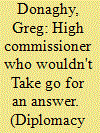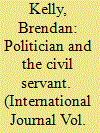|
|
|
Sort Order |
|
|
|
Items / Page
|
|
|
|
|
|
|
| Srl | Item |
| 1 |
ID:
115097


|
|
|
|
|
| Publication |
2012.
|
| Summary/Abstract |
This article examines the public diplomacy of one of Canada's first real public diplomats, Paul Martin Sr., who Prime Minister Pierre Trudeau appointed Canada's high commissioner to Britain in 1974, a bittersweet reward for almost 40 years' work in Canada's Parliament. It traces Martin's efforts to stop British authorities from moving Air Canada's landing rights from London's Heathrow Airport to remote, suburban Gatwick. It opens with a discussion of Martin's views on public opinion, focussing on his firm belief in the value of an informed public in shaping the policy-making process. These ideas inspired his diplomacy in Britain, where he set about re-building Canada's public profile, which had sagged during the 1960s and early 1970s. When his initial private efforts to resolve the looming Anglo-Canadian dispute over landing rights at Heathrow Airport failed, he moved the fight into the public realm. Explored here are his tactics and the messages he used to win over the British public to the Canadian cause, forcing the British government to retreat and preserving Air Canada's landing rights at Heathrow.
|
|
|
|
|
|
|
|
|
|
|
|
|
|
|
|
| 2 |
ID:
164372


|
|
|
|
|
| Summary/Abstract |
Canadian international history is currently enjoying an Asian moment. A handful of younger scholars have cast their attention eastward, generating exciting new work on Canadian relations with specific countries and regions across the Pacific region. This article draws on some of their work, as well as the author’s own long-standing research on Canada’s Department of External Affairs, to weigh the Pacific’s changing importance to Canada. The article argues that the domestic and foreign policies of Prime Minister Pierre Trudeau, elected in 1968, were truly transformational. Trudeau swept away the traditional hesitations and confining North Atlanticism that characterized the diplomacy of his postwar predecessors. Instead, he pursued a full-throttled policy of strategic engagement that repositioned Asia front and centre of contemporary Canadian foreign policy.
|
|
|
|
|
|
|
|
|
|
|
|
|
|
|
|
| 3 |
ID:
152495


|
|
|
|
|
| Summary/Abstract |
This article uses the experience of Marcel Cadieux, the Canadian under-secretary of state for external affairs at the time, as a lens through which to understand the adaptation of the Department of External Affairs to the government of Pierre Trudeau during its first year-and-a-half in power. Drawing on Cadieux’s private papers, especially his diary, and other archival sources, it explores the prime minister’s attitude toward senior civil servants, his personality, and the review of national defence policy undertaken by the bureaucracy at his request. It concludes that the difference between Pierre Trudeau and Marcel Cadieux was essentially that between the brilliant politician who sought to redefine government and the consummately professional civil servant who believed in his department’s traditional role.
|
|
|
|
|
|
|
|
|
|
|
|
|
|
|
|
| 4 |
ID:
159853


|
|
|
|
|
| Summary/Abstract |
Within the literature on human rights, the 1970s are often viewed as a period in which rights achieved a breakthrough globally. While rights regimes, activist networks, and the overall discourse of human rights certainly came into their own during this decade, the rights revolution had its limitations, particularly at the international level. In the Canadian context, the government of Pierre Trudeau advanced a domestic rights program, culminating in the Charter of Rights and Freedoms. In terms of foreign policy, however, Trudeau was far more cautious. Tracing Pierre Trudeau’s stance toward international human rights, this article points to the prime minister’s realist outlook as having delimited the place of rights in Canadian foreign policy during his time in office. Thus, there was little enthusiasm on the part of the Canadian government to support self-determination movements, to impose bilateral sanctions against abhorrent regimes, or to loudly condemn rights violators when doing so would seemingly accomplish little. The point of this paper is not to condemn Trudeau, but rather to understand why Canada’s rights revolution stopped at the water’s edge.
|
|
|
|
|
|
|
|
|
|
|
|
|
|
|
|
| 5 |
ID:
146494


|
|
|
|
|
| Summary/Abstract |
Many scholars have noted that Pierre Trudeau became a stronger supporter of the North Atlantic Treaty Organization (NATO) in the mid-1970s, and the common wisdom is that he was forced into this change to appease allies. Canada was looking to develop trade links with Western Europe, and allies, notably West German chancellor Helmut Schmidt, told Canada to beef up its defences if it wanted trade. Although there is evidence to support this argument, it has obscured other critical reasons. This paper argues that Trudeau came to support NATO because of an acceptance of the alliance’s role in maintaining the balance of power between East and West and Schmidt’s accommodating, rather than mercenary, approach.
|
|
|
|
|
|
|
|
|
|
|
|
|
|
|
|
|
|
|
|
|